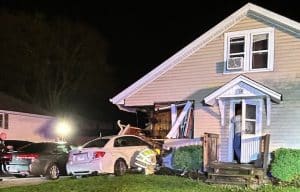IEPA turns on Columbia leaf issue
When the City of Columbia purchased a Titan Pro Plus Vacuum in September, the stated goal was to improve the city’s leaf and limb program while also saving money over using contracted work.
Following a successful fall pick-up, however, the city has endured a barrage of communication from a concerned resident, multiple visits from the Illinois Environmental Protection Agency and, most recently, a violation notice for an alleged offense about the city’s handling of collected leaves.
In response to the violation notice received last week, Columbia City Administrator Doug Brimm has requested a meeting with all IEPA parties involved with tests performed at Columbia’s leaf disposal site located off Bremser Road.
“The city vehemently contends it followed all IEPA guidance and will vigorously defend itself against any claims to the contrary,” Brimm wrote in an April 22 letter to the IEPA.
The matter began in the fall shortly after the city approved the purchase of the leaf vacuum. Columbia resident Donald Henson addressed the city council during a September meeting with concerns the city was exceeding IEPA restrictions regarding the amount of leaves in a specific coverage area, among other issues.
While the city assured Henson it had been in contact with the IEPA regarding leaf disposal regulations, it voluntarily reached out to the IEPA, which performed two separate tests at the Bremser Road site. One test was conducted by the IEPA Bureau of Water on Dec. 7 and the other by the IEPA Bureau of Land on Dec. 29.
For each test, no violations were noted, and the City of Columbia in early January informed Henson it considered the matter closed.
Despite the findings of the two IEPA visits, Henson was not convinced the leaves were being handled properly. He then began submitting multiple Freedom of Information Act requests to the City of Columbia to obtain information about the method of leaf and water sample collection and other specifics about the IEPA tests.
Henson also contacted more government agencies, including the IEPA and U.S. EPA, sending dozens of emails to various organizations as well as continuing his communication campaign with members of the Columbia city staff and elected officials.
In response to Henson’s insistence, the IEPA sent another member of its water bureau to the Bremser Road site and completed another test on Feb. 18.
The last IEPA inspection claimed precipitation on collected leaves created a “leachate from the applied landscape waste” which was discharged into a nearby creek, thereby creating a water pollution violation.
Brimm believes the timing is suspect, stating in his April 22 letter that “to abruptly pull an about-face on this matter through the issuance of this violation notice seems to be indicative of IEPA leadership caving to an individual acting in a capacity not grounded in reality in an attempt to simply make him go away. Unfortunately, this is resulting in the City (of Columbia) being used as a scapegoat.”
Brimm added while Columbia has acknowledged receipt of this alleged violation, “at this time, the city will not entertain entering into any compliance commitment agreement.”
He added the leaves are not currently at the Bremser Road site as the city had already incorporated leaf debris into the soil at the end of March.
Brimm noted that on-site incorporation of the leaves does not imply “admitting culpability to the baseless allegations.”
Per IEPA guidance, the organization has 60 days from Columbia’s receipt of the violation to respond to the request for a meeting.






